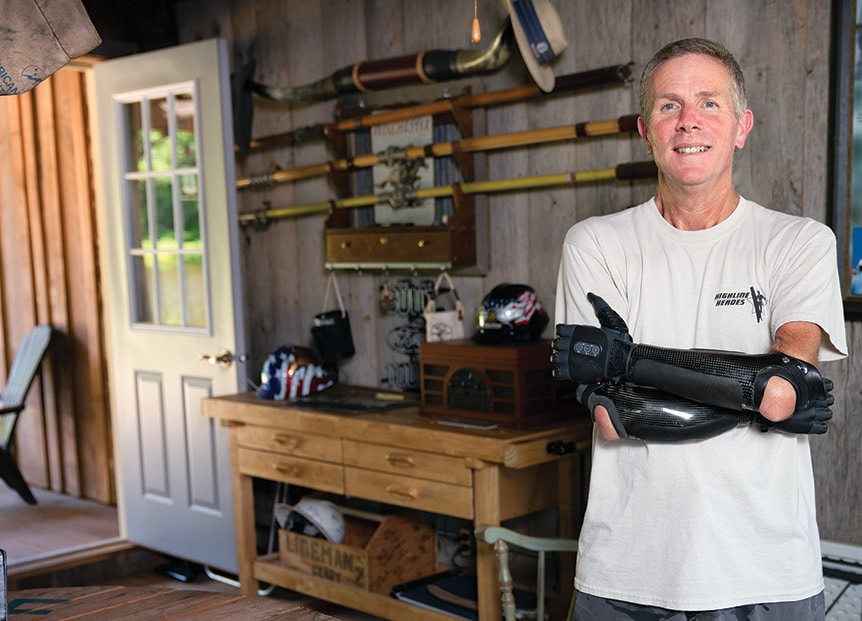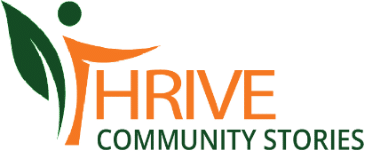
How do we measure our personal growth? One way is having a tangible reminder of how far we’ve come. Or maybe we notice it first on the inside, like when we’re able to turn our frustration into kindness and compassion or push past challenges instead of giving up. We asked three people with upper limb loss to talk about how they’ve grown as individuals and prosthetic users with the help of their families and a specialized prosthetic care team.
Gerry Kinney had been working as a lineman for 20 years when he made contact with a power line in 2015. Both his arms had to be amputated below the elbows. Since Gerry’s injury, he has gone on to instruct linemen in training programs, telling them: “There are three things that got me through life before my accident and the same three things are still pushing me forward: a good attitude, perseverance, and the ability to adapt to change.”
All those things led Gerry to construct a new space at his farm that he calls the Lineman’s Cave.
“I’m super proud of the work that I’ve done in here since most of it was completed after my limb loss. In a sense, I look at this room as my path to using prostheses. It’s filled with lineman memorabilia and things from my career.” Gerry learned a lot about patience as he tackled the electrical wiring and woodwork. “This room allowed me to figure out new and different ways of doing things — it got me on the road to actually putting the awesome prostheses I have to use and figuring them out.” In the beginning, Gerry thought he was creating the space for himself. “But it’s actually a sanctuary for my wife and I, ‘cause I can tell you, Denise would say there’s no place she’d rather be.”
Gerry’s limb loss led him to create a refuge for him and his wife, who he says is “my rock” and the biggest factor in his success. This sort of deep appreciation for another person is similar to what Taylor Eastlack has experienced since her amputation in November 2020. She lost her right hand at the wrist in a workplace accident and says that the injury has led her to become a more empathetic human: “The most important way I’ve grown since my limb loss is that I’m more compassionate and understanding of other people, especially my family. I don’t get irritated about small things like I used to. I don’t snap at my loved ones. It’s like that automatic trigger of irritation is gone — I have a sense of freedom from that.”
Taylor returned to her job with a myoelectric prosthesis and uses an activity-specific device to pursue activities that build her strength, balance, and flexibility — boxing, yoga, cycling, kayaking, jet skiing and weightlifting. “It’s teaching me to focus on the present moment, on what I can do, what I’m able to do, and let go of the rest.”
Mark Betters also has a knack for staying focused on what he can do to help himself, even when he lost his thumb, index and middle fingers in an accident on his construction job. “I think that the way I got through it, the way I thought about it was, ‘Okay — this bad thing happened. Now what’s the next step?’ Mark opted for a toe transfer to replace his thumb, and hammered his way, literally and figuratively, through hours of therapy to adapt to his prosthetic fingers. He went back to his construction job as soon as he could and uses his new thumb and prosthesis every day to handle five-gallon buckets of oil, loops of electrical cables, and operate heavy equipment.
Mark reflects: “Every little step of my journey helped me accept and grow, and eventually led me to what I have today. There’s nothing lacking in my life because of my accident. How I use my new hand just feels natural to me. I mean, I couldn’t be happier.”
While growth is measured differently for each of these individuals, they’re all moving in the same forward direction with their lives, drawing on their perseverance and ability to adapt to change. By integrating specialized occupational therapy and prosthetic care, Gerry, Taylor, and Mark had deep support from the team at Arm Dynamics to help them recover from complex injuries. Instead of allowing their traumatic experiences to hold them back, they’ve chosen to reach out and grow in new directions.

